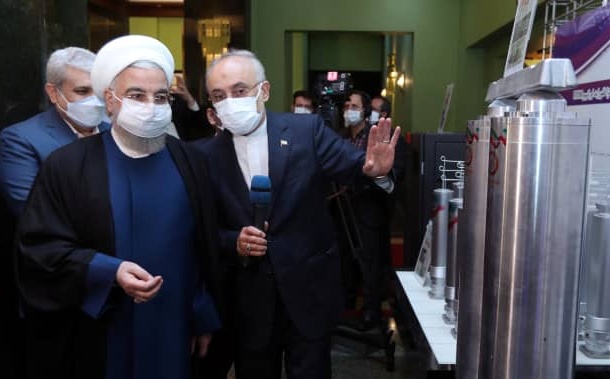Iran President Hassan Rouhani and head of the Atomic Energy Organization Ali Akbar Salehi at an exhibition on National Nuclear Technology Day, Tehran, April 10, 2021
The head of the International Atomic Energy Agency has called on Iran to provide information about its nuclear program “without further delay”.
Reporting to the IAEA Board of Governors on Monday, Rafael Grossi cited Iran’s failure to answer questions about the discovery of uranium particles at three former undeclared sites — a “clear indication that nuclear material and/or equipment contaminated by nuclear material has been present at these locations”.
Since January, Tehran has limited IAEA inspections. It has withdrawn from the Additional Protocol to the Nuclear Non-Proliferation Treaty, blocking any snap visits to sites and withholding all video surveillance tapes.
Iranian officials threatened to withdraw completely from their agreement with the IAEA, but agreed a one-month extension with Grossi in late May.
The IAEA head cautioned Iran at the time, “This is going to affect the credibility of your country in general and the chances for any bigger wider agreement that you want to enter with your counterparts in the JCPOA [2015 nuclear deal].”
See also Concern Over Uranium at Iran’s Undeclared Nuclear Sites — IAEA Head
Grossi told the IAEA Board on Monday that his “expectations were not met” and that there had been no “concrete progress” in the “increasingly difficult” situation:
Talk must lead to conclusions….We cannot limit and continue to curtail the ability of the inspectors to inspect and at the same time pretend that there is trust….
We have a country that has a very developed and ambitious nuclear program which is enriching at very high levels…very close to weapons grade.
Grossi’s report said inspections had been affected since February 23: “The lack of progress in clarifying the Agency’s questions concerning the correctness and completeness of Iran’s safeguards declarations seriously affects the ability of the Agency to provide assurance of the peaceful nature of Iran’s nuclear program.”
Iran’s Ambassador to the IAEA, Kazem Gharibabadi, responded on Tuesday, “The International Atomic Energy Agency Secretary-General’s recent positions reflect the IAEA Secretariat’s unilateral attitude towards the cooperation with Iran, and ignorance of the level of the bilateral cooperation. This can develop into an obstacle in the way of future interaction between the two sides.”
US: Iran Could Reduce “Breakout Time” to Weeks
Speaking on Monday about nuclear talks in Vienna, US Secretary of State Antony Blinken said that if Iran does not return to compliance with the 2015 deal, its “breakout time” for nuclear weapons capability will be only weeks.
The fifth set of discussions adjourned last week. Brokered by the European Union, they are seeking a US return to the deal, the lifting of American sanctions, and Iranian compliance with a step back from enrichment of 20% and even 60% uranium.
“It remains unclear whether Iran is willing and prepared to do what it needs to do come back into compliance,” Blinken told legislators. “Meanwhile, its program is galloping forward….The longer this goes on, the more the breakout time gets down.”


“…race is tightening…”
That is cute, someone in the mullah state should make a bumper sticker of that
Turnout estimated at 47% so far: https://www.presstv.com/Detail/2021/06/08/658547/Iran-presidential-election-2021-Press-TV-study-of-polls-voter-support
What can change the turnout is if the reformist parties decide to support either Hemmati or Mehralizadeh. If the public feel the race is tightening, then there is more chance that they will show up. Also, any breakthrough in the nuclear negotiations could have a similar effect.
Widespread skepticism on the streets of Tehran regarding the election. One resident makes a good point in that the president usually does something in his first term, but very little in second term (if re-elected): https://www.presstv.com/Detail/2021/06/08/658520/Iran-2021-Presidential-Election-People-Polls